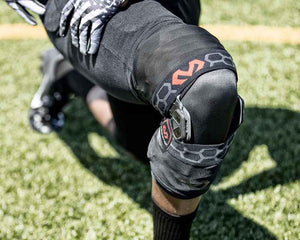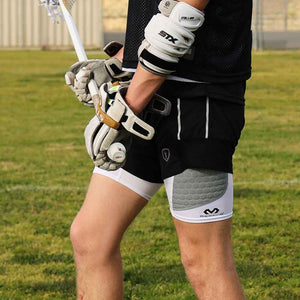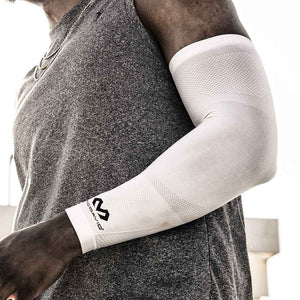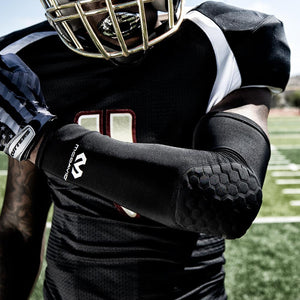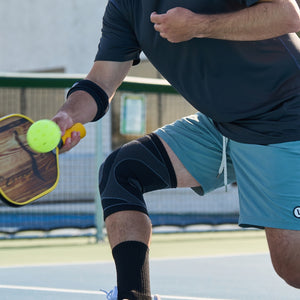At McDavid, we've put ourselves to the test long before you'll ever put us to the test. We are driven by athletics, mathematics and statistics. Step into your next athletic endeavor with proven and constantly improving McDavid gear.
Check out the facts, figures and focus we apply to all of our products, ideas and selves.
Like our McDavid athletes, we have total confidence in the extreme quality and ultimate protection of HEX® technology. In order to add hard independent calculations to heartfelt individual claims, we put HEX® to the test beyond the field, diamond, or court and into the laboratory.
We handed HEX® pads and products over to the highly regarded professionals at The Center for Human Performance of San Diego, California.
The Center for Human Performance (CHP) is one of the nation's go-to, state-of-the-art motion analysis institutes. CHP operates service-based programs and integrated research in sports science, gait analysis, biomechanics, orthopedics and motion capture for animation. The Center observes, examines and bio-mechanically measures human performance ranging from walking to swinging a golf club, throwing a baseball to all the hardcore things we had them do to McDavid HEX® .
We asked them to (technically speaking),"Bring it." The Center proceeded to put Hex face-to-face, fabric-to-fabric and pad-to-pad against products from our competing brands.
Test away. Science does not care how mammoth your marketing budget is, or how many times your logo appears on the TV - science only cares about truth.
Click icon for a face-full of science






To Brace or Not to Brace: Study of High School Basketball Players Supports the use of Lace-up Ankle Braces
Groundbreaking research shows that players wearing lace-up ankle braces experienced three times fewer ankle injuries
Ankle injuries - among the most common in sports - can sideline athletes, incur medical costs and even become chronic. The cost of medical treatment and lost playing time can be significant. Many experts encourage the use of ankle braces to help prevent ankle injuries, but no comprehensive studies had been conducted to help determine if wearing ankle braces reduces the incidence of injury. Now a first of its kind large-scale study examines the effectiveness of lace-up ankle braces in preventing acute ankle injuries in adolescent athletes.
Researchers from the University of Wisconsin-Madison conducted a study with 1,460 male and female high school basketball players from 46 high schools in Wisconsin over the course of the 2009 - 2010 season. One group, comprised of 740 players, wore McDavid Ultralight 195 Lace-Up Ankle Braces. The other group of 720 did not wear ankle braces. The control group - those not wearing the brace - experienced 78 acute ankle injuries while the braced group had only 27 acute ankle injuries.
"The research suggests that wearing lace-up ankle braces is a cost-effective injury-prevention strategy for adolescent basketball players," said Tim McGuine, University of Wisconsin sports medicine researcher, athletic trainer and lead author of the study. "Basketball has one of the highest rates for ankle injuries, and this study illustrates how a simple brace can help keep an athlete on the court."
There have also been previous concerns that limiting the ankle's mobility with a brace might have an impact on basketball players' knee injuries, which can occur when the knee suddenly twists but the foot stays planted in place.
But the study showed no significant difference in the two groups' risk for knee injuries; there were 15 in the brace group and 13 in the comparison group. It's likely, McGuine said, "that the softer, flexible lace-up brace does not put the knee at risk in the way that a semi-rigid plastic brace might."
Other studies have found that training focused on balance, coordination and jumping technique can also reduce ankle injuries in high school basketball players. The best approach might be a combination of training and ankle bracing, according to the researchers. "The more we can do to prevent these injuries in kids, the more we'll save in healthcare costs in the long run" said McGuine.
The study was funded by the University of Wisconsin Department of Orthopedics and Rehabilitation and the University of Wisconsin Sports Medicine Classic Research Fund. The study, "The Effect of Lace-up Ankle Braces on Injury Rates in High School Basketball Players" was published in the September 2011 issue of The American Journal of Sports Medicine. Download a PDF of the full study.
About the Ankle Brace
The lace-up ankle brace selected for the study was the McDavid 195™, which is used by many collegiate and high school players. The brace can fit the right or left foot and is constructed of synthetic fabric. It is worn over a single pair of socks and laced in the front. Two straps wrap around the ankle are secured with Velcro while another elastic band wraps around the top of the ankle for a snug fit. The research staff and school athletic trainers instructed study participants in the proper application and fitting of their braces and told them to wear them for each team-organized conditioning session, practice, or competition until the season was completed.
More Info
American Journal of Sports Medicine
Search for peer-reviewed, research-based articles on sports injuries by type or by sport.
Risk Factors for Ankle Sprains
Experts provide an overview of research on ankle sprains.
Compression Garments and Athletic Performance
Read a comprehensive review of research and recommendations on the effect of compression garments on athletic performance and recovery.
Sport Injuries/Sports Conditions
Check out these sites for additional information on sports injury prevention and treatment.
Stop Sports Injuries Campaign
The STOP Sports Injuries Campaign was created to help prevent athletic overuse and trauma injuries in youth athletes. The site provides injury prevention tips by sport and other sport-specific resources.
Sports Injuries Directory
WebMD provides a sports injuries directory, including articles, videos and injury treatment guidelines.
Sports Injury Clinic
Click on an area in a body graphic for an explanation of an injury, including treatment, rehabilitation and exercises.
